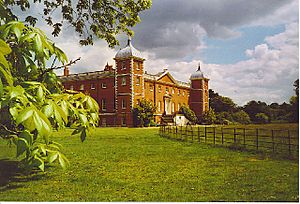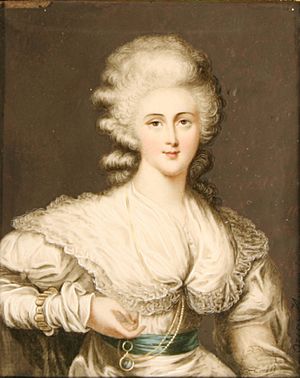Robert Child (Wells MP) facts for kids

Robert Child (born February 1739 – died 28 July 1782) was an English banker and a politician. He served as a Member of Parliament (MP) for the town of Wells from 1765 until he passed away.
Contents
Robert Child's Career
Robert Child was the second son of Samuel Child, who was also a Member of Parliament. In 1763, Robert took over from his older brother, Francis, as the main person in charge of their family's bank, Child & Co.. This job brought him a very large income, more than £30,000 each year. He also inherited a large estate called Osterley Park in Middlesex. At Osterley Park, he continued the work his brother had started, updating the house with designs by the famous architect Robert Adam.
Becoming a Member of Parliament
In 1764, Robert Child tried to become a Member of Parliament for Aylesbury in a special election, but he had to stop because he wasn't feeling well.
The next year, he ran for MP in Wells. It was a very tough election. Two different vote counts happened: one said Robert Child won, and the other said his opponent, Peter Taylor, won. Peter Taylor was a local grocer's son who had become rich working for the army. In early 1766, Robert Child was officially given the position after a special request was made. It seems he did not speak much in the House of Commons, which is where MPs meet. He usually voted against the government, even though his bank did a lot of business with them.
Robert Child's Family Life
In October 1763, Robert Child married Sarah Jodrell. They had only one child, a daughter named Sarah Anne, who was born in 1764.
Sarah Anne's Marriage
In May 1782, Sarah Anne ran away to Gretna Green to marry the 10th Earl of Westmorland. Gretna Green was a place in Scotland where young couples could get married quickly without their parents' full permission. Her father, Robert Child, really disliked the Earl. He chased after the couple, and during the chase, one of his horses was shot.
Robert Child passed away in July of that same year. Before his death, he had agreed to the marriage. However, he changed his will so that his daughter would not inherit his money directly. He did this to stop his large fortune from going to the Earl of Westmorland.
Passing Down the Fortune
Instead, Robert Child's wife, Sarah, inherited the right to use the bank's money for her lifetime. She remained a senior partner in the bank until she died in 1793. She married again in 1791 to Francis Reynolds-Moreton, but she did not let him manage the bank.
After Sarah's death, Robert Child's will stated that his estate, including Osterley Park and the main role in the bank, should go to the second surviving son or eldest daughter of Sarah Anne. Since only one of Robert Child's grandsons survived, the estate eventually went to his eldest granddaughter, Sarah Sophia Fane. She married George Child Villiers, but like her grandmother, she managed the bank herself and did not include her husband in the partnership.
Sarah Sophia Fane was incredibly wealthy. When she got married in 1805, she gave £20,000 to her father, her brother, and her two sisters. Even after giving away so much money, she still had an annual income of more than £60,000 from her inheritance.
 | Jewel Prestage |
 | Ella Baker |
 | Fannie Lou Hamer |


